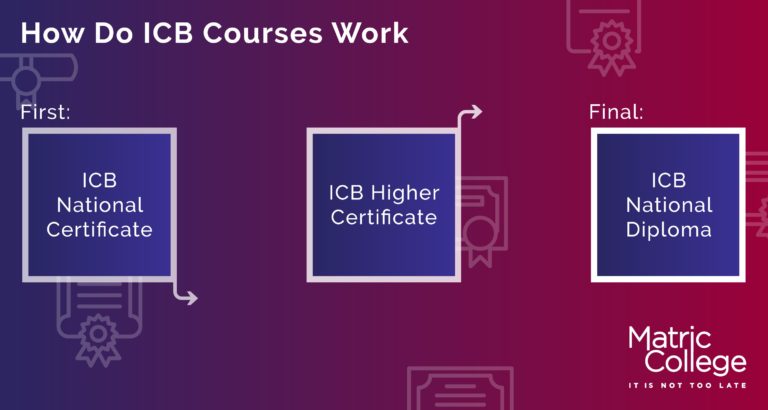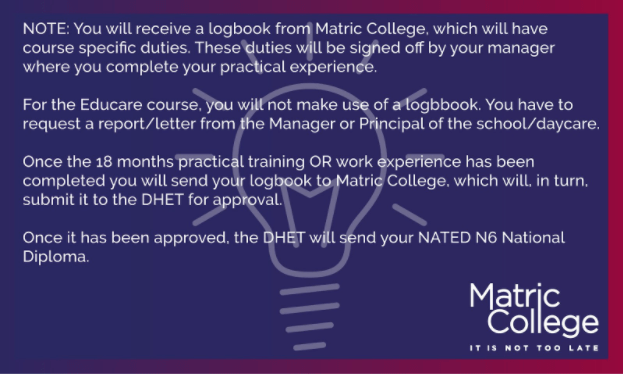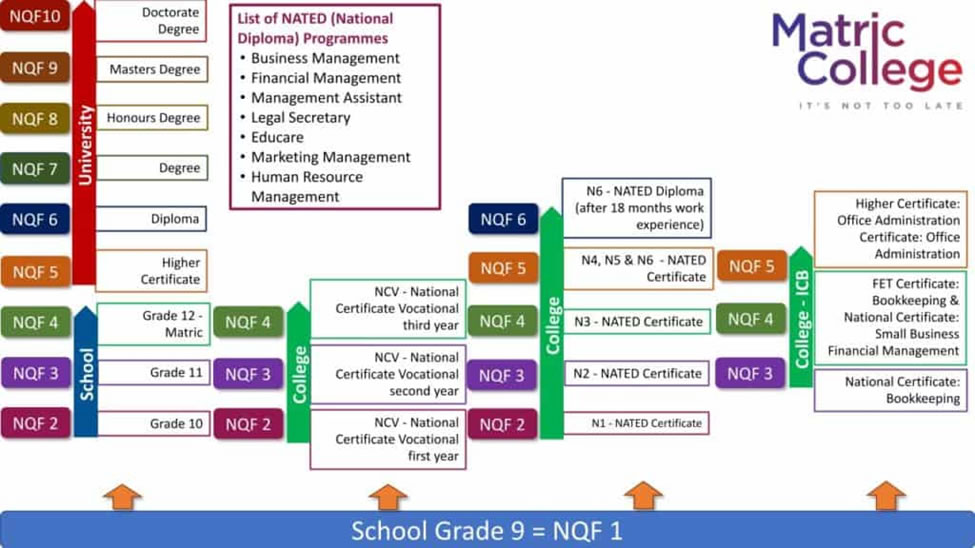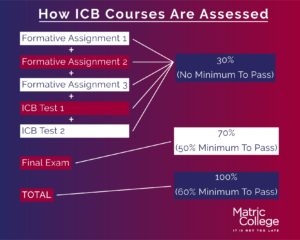If you are looking for a course to study in 2024, look no further, at Matric College we have over 70 courses you can study with or without a Matric Certificate. Start your educational journey with one of our A – Z list of courses:
Which Is The Best Course Now?
The best courses to study now depend on the following factors:
- Where are you at in your life?
- What can you afford?
- How long do you plan on studying?
- Do you want to work and study?
- What are you interested in studying?
The table below explores these questions in-depth:
| Questions | How to approach these questions |
| Where are you at in your life? | I have not completed Matric: In this case, you can complete one of our Matric Courses:
You want to change your career path: In this case, you should apply for an accredited and recognised course. All of our ICB and NATED courses are accredited and recognised by employers. You want to get a promotion: In this case, you can apply for one of our short courses and in some cases even complete the Adult Matric course. E.g a cleaner wants a supervisor position but needs to complete Matric You want to learn a new skill: In this case, you can complete any of our courses. We offer accredited and short courses. |
| What can you afford? | Quality education in South Africa is expensive but at Matric College we offer affordable studies that you can pay for with the following payment methods:
|
| How long do you plan on studying? | If you want a course that you can complete quickly, you should consider applying for one of our short courses, or completing one course in an entire programme. |
| Do you want to work and study? | Matric College offers distance learning courses. This means you can spend your time based on when you are available. You do not have to attend any physical classes or scheduled online classes. |
| What are you interested in studying? | This is the most important factor in your choice for a course. You have to enjoy what you are studying. This means that your success rate will be higher. If you are not passionate about your studies, chances are that you might lose interest. |
What Are The Best Courses For The Future In South Africa?
Here is a list of the best courses for the future in South Africa:
- Art Courses
- Business Courses
- Design Courses
- Economic Courses
- Engineering Courses
- Management Courses
- Marketing Courses
How Do I Choose A Course?
You should choose a course based on the following factors:
- The working environment you like
- Your interests
- What you are good at
Here is what we offer at Matric College:
| Tutor Assistance | If you need assistance with your assessments, our tutors will help you to the best of their abilities. They are available Monday to Fridays, 08:00 am to 05:00 pm. |
| Study Material | You do not have to pay separately for your study material. This is part of your course fees. Your study material will be couriered to your door within 5 to 7 days after you have successfully registered. NOTE: We use a Third Party courier service |
| Course Experts | Our course experts play an advisory role. They will help you choose the perfect course for you. The course will suit your needs, interests and pocket. If you have questions about the different course options, you can contact them to get more information. |
| Red Alert Form | If there are any urgent issues regarding your studies, you can fill out the Red Alert form. This will inform us about your concerns, and we will contact you as soon as possible. |
| Accreditation | Our ICB, NATED and Matric Courses are accredited to ensure you obtain a quality education. Employers employ people who have courses that are credible. |
What Courses Are In Demand?
The courses that are in demand are scarce skill qualifications. All of our ICB courses are scarce skill qualifications.
This means that employers are looking for people with these particular skills.
This also means that you can:
- Earn a decent salary
- Always stand a chance of finding employment
- You can use your skills in other industries
The following NATED courses are also scarce skill qualifications:

Why Choose To Study Via Distance Learning
You should study via distance learning for the following reasons:
- Adapt your study schedule to your needs
- Get a scarce skill qualification
- Payment plans are available to suit your needs
- Work and study
Study At Your Own Pace
The flexibility of distance learning allows you to study at your own pace. You do not have to submit assignments by a certain date. You can submit your assignments before registering for the exam, as long as you do so before the registration deadline.
Study A Scarce Skill
Our ICB and some of our NATED Courses are scarce skill qualifications in South Africa. These skills are in demand because employers need them in their businesses. It is likely that graduates of these programmes will earn a good salary and become highly employable.

Payments According To Your Needs
Matric College students are encouraged to set up their own payment plans. We offer the following payment methods:
- Advance payments: This option allows you to pay your tuition in advance
- Split payments: If you select this option, you will pay half of the total amount at the beginning of the year, and the other half at the end of the year
- Monthly payments: This payment option allows you to pay a fixed instalment each month
- Payment method unique to us: Choose a payment method that suits all parties. Talk to one of our friendly and knowledgeable course experts and discuss a payment plan that works for both of us.
Work And Study
We communicate with our students via email and Telegram because we are a distance learning college. All of our courses are available through distance learning. You can work and study at the same time because there are no physical classes to attend or online classes that are scheduled. You may submit your assignments through email for NATED Courses and through the ICB Student Portal for our ICB Courses.
NATED Courses
National Accredited Technical Education Diploma (NATED) courses are designed by the Department of Higher Education and Training. Each course builds on the previous one. To complete the N5 National Certificate course, you must first complete the N4 National Certificate course. National Qualifications (NATED Courses) consist of two parts:
- Theory
- Practical
It usually takes 18 to 36 months for each component to be completed. It is therefore necessary to complete 18 months of theory and 18 months of work experience for the full course (N4, N5, and N6).
Theory
This is a component of National Qualifications (NATED Courses) consisting of various modules. Students learn how to approach the practical portion of the course through these modules.
Practical
The practical component of this course involves 18 months of training at a job. You can approach your 18 months of work experience in three ways. Listed below are three ways to complete your work experience:
- Theory for 6 months, then work experience for 6 months
- Theory for 12 months, followed by work experience for 12 months
- Theory for 18 months and then work experience for 18 months
NOTE:
You can complete your theory along with your work experience. This will allow you to finish your course faster.
You can only apply with a Matric Certificate. All of our NATED Programmes, require you to meet the following entry requirements:
- Be at least 16 years or older
- Understand, read and write English
- Have a Matric Certificate, National Senior Certificate, or an Amended Senior Certificate
- Study through distance learning
Yes, NATED courses are accredited by these professional bodies:
Employers recognise NATED Courses because they are designed by the Department of Higher Education and Training to prepare students for the workplace. Employers recognise these courses because they have both theoretical and practical experience.
Yes, distance learning programs offer placement. Matric College offers National Qualifications (NATED courses) that allow students to acquire both practical and theoretical skills. To prepare students for the workplace, the Department of Higher Education and Training designed these courses.
The Department of Higher Education has established the iWIL services. These services assist students with work placement. Students are matched with potential employers who are looking for students to complete their work experience or for full-time employment.
NOTE:
Make sure that you register yourself and check your email once your application has been approved. The placement is not guaranteed.
NATED courses cannot be compared to other courses. There are two reasons for this:
- They have different exit-level outcomes
- They have different purposes
Despite being recognised on the NQF Levels system, these courses are not the same as any other qualifications. Below is a table of our courses and their NQF levels:
No, you cannot do NATED Courses without Matric. You can only apply with the following certificates:
If you do not have a Matric Certificate, you can apply for any of our two Matric Courses. These courses give you the opportunity to complete your Matric:
- Adult Matric – If you do not have Matric (If you have only completed: Grade 9, 10, 11, 12)
- Matric Upgrade – if you have completed Matric (failed Matric or want to improve your marks)
You can determine what type of qualification you have achieved by looking at your NQF levels. For example, a Grade 9 or ABET level 4 is equivalent to an NQF level 1. NATED Levels are qualifications that can be seen on the NQF system, and they have SAQA ID Numbers. Here is a table with the different NATED Courses and their NQF Levels.
| NATED | NQF Levels |
| N1 National Certificate | NQF Level 2 |
| N2 National Certificate | NQF Level 3 |
| N3 National Certificate | NQF Level 4 |
| N4 National Certificate | NQF Level 5 |
| N5 National Certificate | NQF Level 5 |
| N6 National Certificate | NQF Level 5 |
| N6 National Diploma | NQF Level 6 |
These highlighted qualifications are NATED Qualifications that you can get after completing our NATED courses.
Yes, you can apply for a NATED Course with a Higher Certificate Matric Pass Level.
In fact, you can apply for any of our courses with any Matric Pass Level. Here are the different Matric Pass Levels:
The following are the main differences between NC (V) and NATED:
| NCV | NATED |
| NC (V) stands for National Certificate (Vocational). | NATED stands for National Accredited Technical Education Diplomas. |
| NC (V) courses give students the opportunity to master skills outside a traditional classroom setting. | NATED N4 – N6 Courses enable you to specialise in one field of study after you complete your Matric. |
| NC (V) courses lead to NQF Level 4 and are equivalent to a Matric Certificate. | NATED courses are at NQF Level 6, which is the same level as a Diploma course. |
| NC (V) courses include school subjects as well as industry-specific subjects. | NATED courses require students to complete 18 months of work experience before earning a NATED National Diploma. |
One NATED National Certificate course typically takes six to twelve months to complete. Taking all three NATED courses N4, N5, and N6 Certificates and the N6 National Diploma can take between 18 and 36 months to complete. This table explains how you can complete a NATED Course at Matric College:
| 6 months | 12 months | 18 months | |
| Only completing the course | N4 National Certificate: Only 6 months of theory will be completed. | N4 and N5 National Certificate: Only 12 months of theory will be completed. | N4, N5, and N6 National Certificate: Only 18 months of theory will be completed. |
| Completing the theory, then moving on to the practical | 6 months of theory, and another 6 months of work experience. Total: 12 months | 12 months of theory and another 12 months of work experience. Total: 24 months | 18 months of theory and another 18 months of work experience. Total: 36 months |
| Bringing theory and experience together | Complete the theory and work experience in 6 months for one course. | Complete the theory and work experience in 12 months for two courses. | Complete the theory and work experience in 18 months for three courses. |
Benefits of Studying At Matric College
There are numerous benefits to studying at Matric College, including the following:
- We offer distance learning courses: Work and earn at the same time
- Our distance learning courses are affordable: they can be paid monthly, annually or any other way you like (discuss this with a course expert)
- Our distance learning college allows you a lot of flexibility: You can study whenever and wherever you want
- There will be a high demand for your skills: This means that you have scarce skills. These skills are in high demand in South Africa.
- Strengthen and develop your organisational skills: Our courses generally allows you to learn skills you can use in the workplace.
ICB Courses
All of our ICB courses build on to the next course. As a result, you need to complete each course step by step within each programme. An explanation of how our ICB Programmes work is shown in the following diagram:

The Institute of Certified Bookkeepers (ICB) is an Independent External Examination body. ICB offers three business programmes through accredited institutions. ICB does not directly offer these courses, but over 500 training providers do.
Matric College is one of the training providers that provides ICB courses and study material. The ICB administers the examination, online tests, assignments, and Portfolio of Evidence.
ICB Qualifications are qualifications created by ICB themselves. They are accredited and recognised both nationally and internationally. There are three business-oriented programmes offered by ICB. The three programmes are as follows:
Each ICB Programme has separate entry requirements. Here is what you need to do an ICB course:
- Be 16 or older
- Have a Matric Equivalent Certificate
- Complete our ICB Bridging course (Junior Bookkeeping: ICB National certificate) with your Grade 10 Certificate
- Understand, read and write English
- Study through distance learning
Yes, ICB will accept Recognition of Prior Learning (RPL) for work experience and education gained within five years of starting an ICB programme.
Work experience and previous studies may be credited if they are recognised by the National Qualification Framework (NQF). Your qualification must have a SAQA ID number.
It Is Important To Note That Credit Exemptions Are Not Guaranteed.
Yes, ICB Courses are recognised by employers nationally and internationally.
You can do the following after completing an ICB Programme:
- Find entry-level Employment
- Further your studies with our ICB Programme
- Further your studies with our NATED Programme
- Further your studies with our Short Courses
ICB does not offer any Degree programmes. All of their programmes go up to a Diploma level. After you have completed your Diploma course you can complete another ICB programme.
Your certificate will be printed by FASSET if your results are approved by ICB for graduation. FASSET will then prepare your Certificate and send it to Matric College. You will then receive your Certificate by courier.
This process can take between 3 – 6 Months.
Our Accreditation
SAQA
SAQA stands for South African Quality Assurance. The primary responsibility of SAQA is to ensure that the National Qualifications Framework (NQF) is implemented. All of our ICB and NATED Courses have SAQA ID numbers. They are therefore NQF-recognised. By entering the SAQA ID numbers provided into the SAQA search engine, you can check whether our courses are accredited.
DHET
DHET stands for the Department of Higher Education and Training. DHET is part of the government’s education system. Universities and post-secondary institutions are under DHET’s jurisdiction. Our NATED exams are administered by DHET, which makes our courses accredited and recognised by employers.
ICB
ICB stands for the Institute of Certified Bookkeepers. They are an independent body that administers business exams. In addition to their courses, ICB has more than 500 approved training providers who offer their study material. We are registered with ICB, and all of our ICB Courses are registered with ICB. This means that all of our ICB courses are accredited.
QCTO
The Quality Council for Trades and Occupations (QCTO) manages the Occupational Qualifications Sub-Framework (OQSF). Everyone who wants to complete a trade or occupation, develop and certify national occupational qualifications, and if appropriate, develop and certify vocational skills can take this course. We are accredited by the QCTO.
Short Courses
Most of our Short Courses have three courses within a Programme. Here is a diagram that explains how they work:
Short Course First, complete this course. |
| ⇩ |
Certificate Course Then complete this course. |
| ⇩ |
Comprehensive Course End your studies with this course, or complete another short course. |
The purpose of a short course can be determined by these factors:
- It allows people who are already employed to upskill themselves while working
- You can learn skills in a short period of time
- You can complete multiple courses at the same time
- You can learn a new skill and see if it is the career path you would like to get into
Short Courses are beneficial to students for the following reasons:
- They are affordable
- They can be completed in a short period of time
- You can get promoted at work
- It shows potential employers your willingness to learn new skills
Any qualification that can be completed in a short period of time and is industry-specific is considered a short course. Short Courses are usually non-accredited but some universities offer accredited short courses.
Short courses can take anything between 30 minutes to 3 months to complete. This depends on the following factors:
- The time you have to complete a course
- How quick you can complete a course
- The deadlines for assignments and tests
Our short courses can take anywhere from 2 months to 6 months to complete.
- They are completed in a short period of time
- You can complete multiple courses at a time
No, short courses do not need accreditation. Students need to make the decision whether or not they would like to complete a non-accredited short course and the institution should be clear to students that the course is indeed non-accredited.
For example, if a student wants to start their own beauty business at home, they can complete a short course in Beauty Therapy. The skills they learn will be for themselves and not for potential employers.
Nothing happens if a course is not accredited. The institution that offers non-accredited courses should be clear to students about their accreditation. Here is how students can find out if a course is accredited:
- Look for the college accreditation on their website
- Check whether the courses have SAQA ID numbers and put them into the SAQA search engine
- Ask the college directly
- You can also contact SAQA directly and ask whether your course is accredited and recognised on the NQF system
This depends on the type of short course. A non-accredited short course has no credits. An accredited short course has credits. Even if a short course is accredited, it still depends on the type of short course you complete. Here are the different types of short courses you get:
| Terms | What does this mean |
| Short Learning Programme | This describes all short courses. It can be accredited or non-accredited. This includes skills programmes, credit-bearing courses and non-credit-bearing courses. |
| Skills Programme | These courses are work-based and industry-specific. It means that these skills will equip you for the working environment. |
| Short Course | These courses are also considered short learning programmes that may or may not be awarded credits. |
| Credit-Bearing Short Course | These courses are also short learning programmes and are awarded credits. These credits usually amount to 120 credits. |
| Non-Credit-Bearing Short Course | These courses are short learning programmes and no credits are awarded. |
Here are the differences between these two courses:
| Short Course | Skills Programme |
| This is a type of short learning programme where a student may or may not earn credits for the course that they have completed | This is a type of learning that is based on work-related skills that are industry-specific. This qualification is recognised on the NQF system. This is also a type of short learning programme |
Yes, you can get a job with a short course. Most employers ask certain staff members to complete a short course to upskill or to get new skills that will help them in their current job.
For example, a Bookkeeper has to do a short bookkeeping software course that will allow them to do their job efficiently and effectively.
In other instances, employers will employ new employees that have completed short courses because they can see that the employee is willing to learn new skills. Sometimes these skills are just what they need for their business.
People Also Ask
Completing a course is important because it allows you to adapt to this ever-changing working environment. Especially with the emergence of the pandemic, people are changing careers and completing courses to either upskill or to gain new skills that will allow them to enter another career path. While you are completing a course, it helps you learn more about yourself. You learn what your strengths and weaknesses are.
For example, if you complete a Business Management Course, you will learn that you enjoy the Marketing aspect more than the Financial aspect of Business Management. This, in turn, helps you to make the decision of furthering your studies in Marketing Management. Here are some of the reasons why a course is important:
- Courses keep you informed
You will be exposed to new ideas, and you will be updated in the area of your studies. You are constantly learning something new if you continue your studies throughout your career. This also keeps you interested in your working environment.
- It sets you apart from the other professionals
Employers usually employ students who have some form of educational background, especially if they see that you have currently studied something new. It shows your willingness to learn new things that will be beneficial to the company.
- You become a well-informed professional
You can use the skills you learn in a course to assist potential clients, as well as take a new approach to the work you are doing.
It is extremely important to ask questions about the course you are interested in before you apply. Here are the three questions you should ask.
- Which teaching methods does the college/university offer?
This varies from course to course and from one university to the next. For example, Matric College is a distance learning college. This means that you will not attend any physical classes and there are no scheduled online classes. If you are a busy student that would like to earn a living while studying, then you should consider taking a course through distance learning.
- How will I be assessed?
Each course will be assessed differently. For example, our NATED Courses consists of three theoretical courses and one practical course. Students will complete three assignments for each course, and there are two exam sittings.
| NATED N4 Certificate | Three open-book assignments in each subject. | There is one final exam set by the DHET. Register in February for May and June or Register in August for October and November. |
| NATED N5 Certificate | Three open-book assignments in each subject. | There is one final exam set by the DHET. Register in February for May and June or Register in August for October and November. |
| NATED N6 Certificate | Three open-book assignments in each subject. | There is one final exam set by the DHET. Register in February for May and June or Register in August for October and November. |
| NATED N6 National Diploma | There are no assignments. (You have to complete 18 months of work experience to get this qualification). | There will be no final examination. (Must complete 18 months work experience to obtain this qualification). |
For our ICB Courses, students are required to complete a Portfolio of Evidence (PoE) for each subject and two open-book tests. Students should apply for the final exam if they qualify. The exam can either be completed online or in person.
- What can I do with my qualification?
Most students should know what they can do with their qualifications and finding employment should be the first question you should ask.
Here are the main differences between these two courses:
| Accredited | Non-Accredited |
| Accredited courses have SAQA ID numbers. | Non-accredited courses do not have SAQA ID numbers. |
| Are recognised by employers. | Are recognised by some employers. |
| Usually takes a long period of time to complete. | Can usually be completed in a short period of time. |
The four types of degree courses that you can study are:
- Bachelor’s Degree Course
- Honours Degree Course
- Masters Degree Course
- Doctorate Degree Course
NOTE:
An Associates Degree is not offered in South Africa. This type of degree is only offered in:
- Australia
- Canada
- Denmark
- The United States of America
- Turkey
There are many distance learning institutions in South Africa. Matric College is a distance learning institution that focuses on Matric Courses, but we do not limit our course options to these courses only. We also offer the following courses:
Author: Jesmé Africa
Editor: Amy Venter
Date Published: March 24, 2022
Online Application Form
"*" indicates required fields





